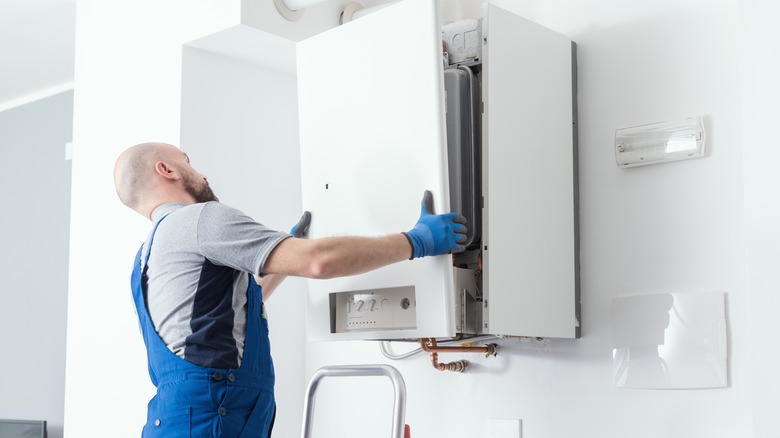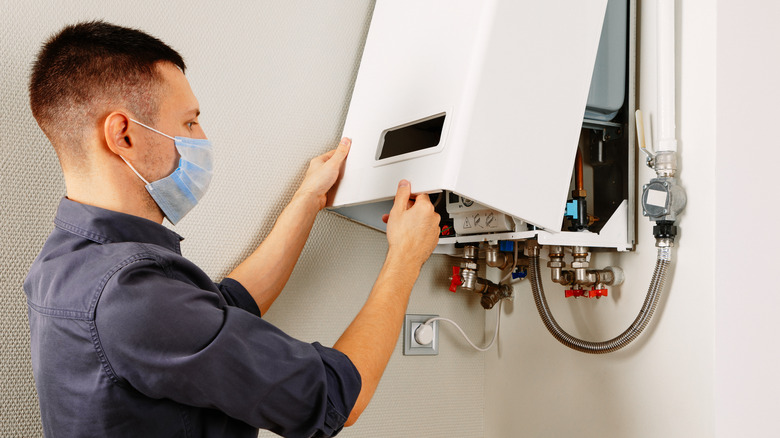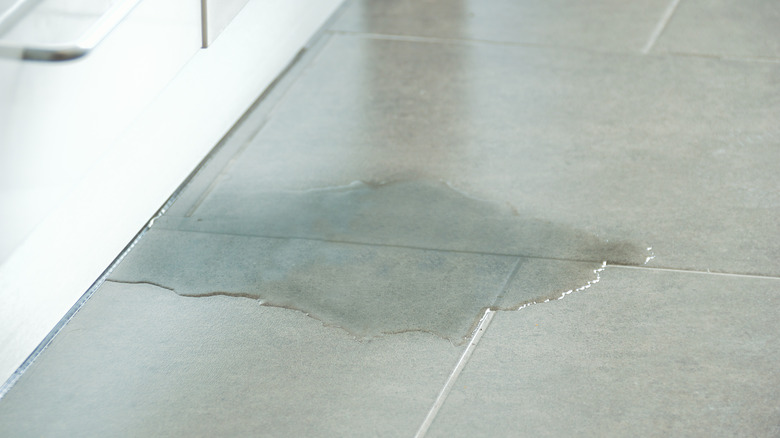5 Telltale Signs That You Need A New Boiler
Let's be honest: A boiler breakdown can be both frustrating and disappointing, especially in the middle of winter or at a moment when you can't afford to invest in a new one. As Murphy's Law states, "anything that can go wrong, will go wrong." However, you can always prevent possible mishaps. Boilers rarely break down out of the blue; they usually sound a warning (literally) for you to either prepare for a repair or start saving up for a new one.
Since Warranty People asserts that boilers have an average lifespan of 10 years, you may as well start looking out for those signs after the first decade. FYI, you can make your boiler last up to 15 years and improve its efficiency by servicing it yearly. But if you keep getting warning signs from your boiler, a replacement may be the best bet. So, if you notice any of the signs we are about to list below, start budgeting an average of $12,000 for a replacement, as Forbes puts it.
Your boiler makes odd noises
Usually, when you switch your boiler on, it makes a quiet rumbling sound. This comes from the boiling and passage of water through heat channels and pumps. But when your boiler starts making strange whistling, gurgling, whirring, or vibrating noises, it may well be a thing of concern (per Ideal Heating). According to Vaillant, the gurgling and whistling noises are caused by air trapped in the water area of the system, while whirring or droning noises are caused by a faulty pump.
However, before considering a replacement, D.R Plumbing & Heating warns you to identify where the sound is coming from, as some of these noises may due to other sources. These include your radiators and pipes that have a connection to your boiler. In this case, the solution is to bleed your system. But if you can't troubleshoot or work up a repair by yourself, Plumbing Wizard advises you to contact a plumber or gas-safe engineer to check your heating system. Otherwise, you may need to get a new one.
You repair your boiler parts too often
Calling technicians over to repair a faulty boiler's component may seem like a good option at first. But when it becomes too frequent and they have to keep swapping out parts, you should consider getting a new boiler altogether. This will save you from constantly splurging on part repairs and replacements. According to Fixr, the cost of a boiler repair depends on the boiler type. Repairing an electric burner costs $500 to $1,800; repairing a gas burner costs $240 to 650; repairing a propane burner costs $300 to $1200; repairing a wood burner costs $240 to 500; and repairing an oil-based system costs $250 to 600. The Eco Experts added that these expenses may vary depending on the parts that need fixing.
A smart way to avoid spending all that money is to commit to servicing your boiler annually. As Household Quotes puts it, the annual service price of a boiler is between $150 and $250. When you know the repair cost of your boiler and the cost of buying a new one, you'll be able to make a guided decision between repairing or replacing it.
Your bills are skyrocketing
Often, when an energy-powered home appliance malfunctions, it starts consuming more energy than ever. However, some appliances are more energy-efficient than their counterparts, per Joe Graham. For some boilers, the increase in energy bills is more likely to be significant. Luckily, Lambda Geeks said that boilers that use electricity, gas, or oil are energy-efficient and, as such, rarely cause high energy bills when they get faulty.
But, if you're not on the lucky side, the Express supports stopping the use of your boiler right away, once the energy bills start skyrocketing. Instead, you should either repair or replace it. However, when making such a decision, it's vital to consider the other possible reasons for an increased energy bill. On this, we recommend that you contact an electrician to confirm the real problem. According to Arcadia, energy bills often go up due to extreme weather, inadequate home insulation, inefficient use of thermostats, a change in your social life, and the usage of inefficient lightbulbs.
Your boiler is affected by water leaks
When your boiler starts leaking water, chances are that there is an overall problem with the system. There are many things that can lead to unusual water leaks. iHeat says that one of the causes is old and weakened pipes that are within the system. In this case, you should consider changing or repairing the affected vessels and pipes. But know that if you always keep your boiler pressure too high (e.g. the pressure gauge indicator always pointing at level 2 or higher), it could still continue leaking no matter how many times you repair it, according to the Boiler Guide.
Also, if the joints on your boiler are not properly tightened, they'll loosen when your boiler contracts with temperature changes and cause leaks (per Trustey Man). For your info, the mystery of a water leak in your boiler should be immediately solved. Being negligent about it, Appliance Analysts writes, can cause the boiler's electrical contents to become short-fused — and we are sure that you don't want to risk a potential fire outbreak with that. To that end, it may be better to purchase and properly install a new boiler instead of calling a plumber to repair a leaking one, as plumbers may only offer short-term solutions.
It gives off an odor
Once your boiler starts emitting a foul smell or sends smoke into your home, that's an indication that you should consider replacing it. The smell could stem from a series of problems in and around the boiler. However, according to Bradford Boiler Company, that smell could be that of carbon monoxide getting trapped indoors instead of being ejected through the flue exhaust, which is probably now blocked. Whenever you detect a gas leak smelling like rotten eggs or Sulphur, open the windows and leave the premises. Also call 911 to report it.
Gas leaks involving carbon monoxide are lethal, according to Mirror. They can also pave the way to an explosion and fires, per Duffy Heating – serious stuff. To that end, a safety precaution, if you smell such odors, is to turn off your gas supply and avoid lighting a match or turning on the stove. Also, you should call a technician to look into the boiler parts whenever you smell a burning electrical odor coming from it. This smell could result from an innate fuse burn. Furthermore, when your boiler starts to overheat, it produces a burnt metal or plastic smell that can be hazardous. In all of these cases, you should never take chances and, instead, get a new boiler for efficiency.





